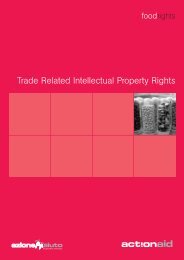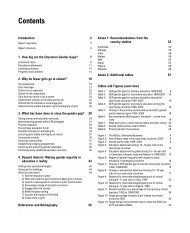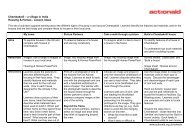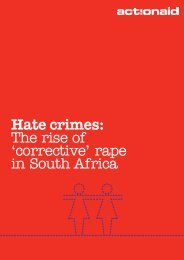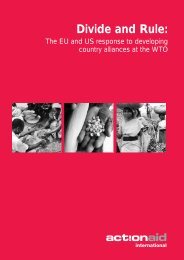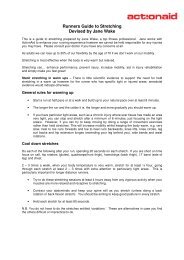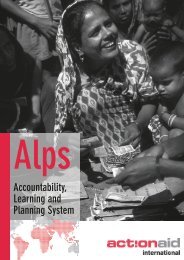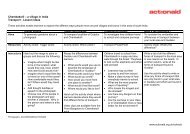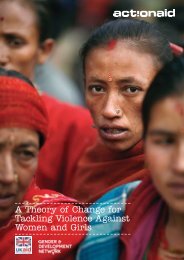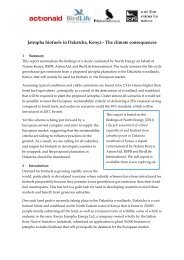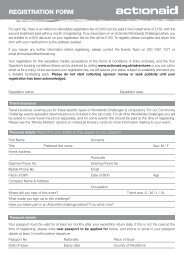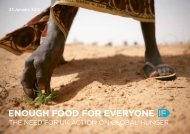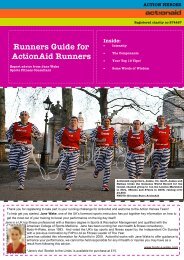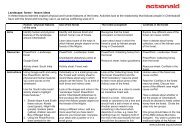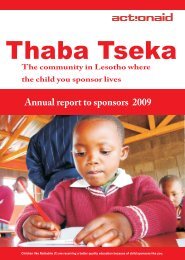common cause - ActionAid
common cause - ActionAid
common cause - ActionAid
You also want an ePaper? Increase the reach of your titles
YUMPU automatically turns print PDFs into web optimized ePapers that Google loves.
12 COVER STORY<br />
COVER STORY 13<br />
Any visitor entering the room could be forgiven for<br />
thinking that this is a class of some sort – but it is much<br />
more than that. The careful making of these charts by<br />
Daasil’s women, many of whom have never held a pencil<br />
before, has brought about deep changes that have<br />
improved and empowered their lives. The charts are the<br />
first steps in an <strong>ActionAid</strong> programme that has brought<br />
villagers together to work for community changes they<br />
never dreamed possible.<br />
Since 2003 <strong>ActionAid</strong> has been carrying out<br />
developmental activities in three districts of northern<br />
Afghanistan. The spearhead of our rural programme in<br />
the region is a community-based plan for change, a<br />
process that enables villagers to discover, prioritise and<br />
put into action the changes that will improve their lives.<br />
<strong>ActionAid</strong> staff, including locally employed ‘social<br />
mobilisers’, work directly in the villages, providing<br />
support and encouragement and recruiting organisations<br />
to help fund and partner the various projects. The<br />
process starts with men and women separately<br />
researching their own village to work out exactly what<br />
needs to be changed. They pinpoint the poorest in the<br />
community and highlight the inequalities between males<br />
and females. They then turn their findings into drawings<br />
on charts, and these are constantly referred to as they<br />
begin to make changes.<br />
“Before <strong>ActionAid</strong> came we knew each other, but not<br />
well. It’s hard for women to gather together and we had<br />
to get permission from the men. For a year we were<br />
going into the mountains and sitting there during the war,<br />
hiding in caves together, but we still didn’t know each<br />
other’s thoughts. We are trying our best to do something<br />
and solve our own problems. We are very happy now<br />
and have improved our lives. The men are very surprised<br />
that we have made decisions for ourselves,” says Bibi,<br />
suddenly slapping her chest. “I now have the power to<br />
speak. I am not afraid any more to say what I think and if<br />
there are any literacy courses coming here I will do<br />
them…even though I am 45 and old.” Her companions<br />
laugh and chorus in support of their friend.<br />
In nearby Abashi village, an <strong>ActionAid</strong> income<br />
regeneration programme is underway as part of its<br />
change plan. Nasima Shorkhoki, 40, proudly shows off<br />
the 20 chickens remaining from the 250 she has<br />
managed to raise with the help of an incubator that she<br />
shares with three other families. “I am a widow with four<br />
children and had no money. Now I am selling the<br />
chickens to the villagers. Before, my brother and<br />
relatives helped me. My husband died be<strong>cause</strong> he was<br />
sick and we didn’t have the money for a doctor.”<br />
On a veranda in the same house, another Bibi busies<br />
herself monitoring the progress of a group of women<br />
weaving a brightly coloured carpet. There are ten<br />
families in the village weaving for $2 a day – a lot of<br />
money for rural Afghanistan. “We are the poorest<br />
families and we are selling the carpets and buying the<br />
wool,” Bibi explains, adding that it takes l5 days to<br />
make one carpet. A widow and mother of seven<br />
children, she is happy with the arrangement. “The next<br />
step is for me to get a cow. I want a big one with plenty<br />
of milk.”<br />
ONE ROOM IS SO PACKED<br />
WITH WOMEN AND CHILDREN IT’S<br />
DIFFICULT FOR THE DOCTORS TO<br />
SQUEEZE THROUGH TO GIVE<br />
THEIR HEALTH EDUCATION<br />
PRESENTATION. THE DOCTORS’<br />
VISIT IS A LONG HELD DREAM FOR<br />
THE WOMEN AND THEY CAN’T<br />
HIDE THEIR EXCITEMENT<br />
Nasima wants to say that even though she is a widow<br />
she can marry again. “What do you want a husband<br />
for?” asks Zakiya, who is about 80 years old. “I have no<br />
teeth and nothing else left for a man!” Nasima ignores<br />
her and wants to show us the incubator that hatches her<br />
eggs in a room behind the weaving loom. It’s hard not to<br />
notice the huge gaping hole in the roof. “Bomb,” she<br />
points, “boom, boom,” and everyone laughs.<br />
In the nearby village of Abdul Malik, <strong>ActionAid</strong>’s three<br />
female doctors from the mobile health team are arriving<br />
at a small house, where one room is so packed with<br />
women and children it’s difficult for the doctors to<br />
squeeze through to give their health education<br />
presentation. The doctors’ visit is a long held dream for<br />
the women and they can’t hide their excitement. On a<br />
verandah outside the nearby mosque, 40 men and boys<br />
are listening attentively to their first health education<br />
class given by Dr Rashid, the team’s only male doctor.<br />
The excited, chattering voices of the women can be<br />
heard through the sycamore trees.<br />
In Afghanistan half a million women die each year<br />
from pregnancy-related complications, the <strong>cause</strong>s of<br />
which are exacerbated by poverty and isolation. The<br />
maternal mortality rate is the second highest in the<br />
world, and diarrhoeal and acute respiratory infections<br />
<strong>cause</strong> an estimated 42% of childhood deaths.<br />
Not surprisingly, every village participating in<br />
<strong>ActionAid</strong>’s programme for change ranks healthcare as a<br />
priority need, although it is men and boys who are given<br />
priority when it comes to urgent medical treatment.<br />
Charts drawn up by the men and women show that if<br />
men or boys are acutely sick they are more likely to be<br />
transported to the nearest town to see a doctor. Women<br />
and girls tend not to be taken to see a doctor until it is<br />
generally too late to save them.<br />
One woman in a red scarf interrupts: “We need a<br />
clinic especially for the women giving birth,” she says.<br />
“My daughter had problems and wouldn’t stop bleeding<br />
after her baby was born. We took her to town and the<br />
doctor said there was no way she would stop bleeding.<br />
We borrowed the money to see him.”<br />
Looking at the eager crowd of women in the tiny<br />
room, it’s surprising to hear from health programme<br />
leader, Dr Manjusha Gupta, that, at first, gathering the<br />
women together in each village was an enormous<br />
obstacle. “Either some were too busy weaving carpets<br />
and thought their time was too precious to be wasted on<br />
health education, or the male in the family was reluctant<br />
to allow women to participate,” she says. “But this<br />
programme had a major advantage in that the health<br />
team consisted mainly of female doctors and the<br />
women’s immediate medical needs could be attended to.<br />
Each woman here today has brought either her own<br />
health problems or a child’s, and will be treated by one<br />
of the female doctors after the class.”<br />
This is good news for a country that is still struggling<br />
to rebuild itself and provide some sort of infrastructure<br />
for its people. But, until it does, it’s business as usual for<br />
the four doctors bravely travelling to some of<br />
Afghanistan’s remotest villages to meet the demands of<br />
people desperate for medical attention.<br />
WE ARE TRYING OUR<br />
BEST TO DO SOMETHING<br />
AND SOLVE OUR OWN<br />
PROBLEMS. WE ARE VERY<br />
HAPPY NOW AND HAVE<br />
IMPROVED OUR LIVES.<br />
THE MEN ARE VERY<br />
SURPRISED THAT WE<br />
HAVE MADE DECISIONS<br />
FOR OURSELVES<br />
Although we do not have a child sponsorship<br />
programme in Afghanistan, you can still support<br />
our work in the country by means of a donation.<br />
To do so, please call 01460 23 8000 or email<br />
<strong>common</strong><strong>cause</strong>@actionaid.org.uk quoting your<br />
supporter number or postcode.<br />
<strong>common</strong> <strong>cause</strong> SUMMER 2004 www.actionaid.org.uk<br />
www.actionaid.org.uk <strong>common</strong> <strong>cause</strong> SUMMER 2004



